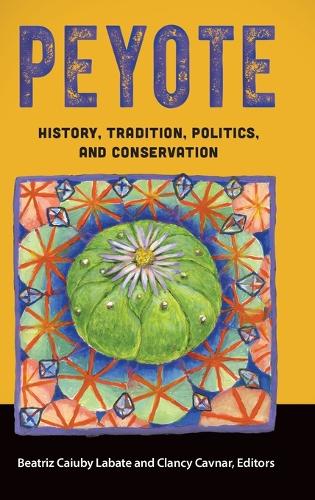
Peyote: History, Tradition, Politics, and Conservation
(Hardback)
Publishing Details
Peyote: History, Tradition, Politics, and Conservation
By (Author) Beatriz Caiuby Labate
Foreword by James A. Bauml
Edited by Clancy Cavnar
Foreword by Stacy B. Schaefer
Bloomsbury Publishing PLC
Praeger Publishers Inc
18th January 2016
United States
Classifications
Tertiary Education
Non Fiction
362.294097
Physical Properties
Hardback
312
Width 156mm, Height 235mm
737g
Description
This book explains the role that peyotea hallucinogenic cactusplays in the religious and spiritual fulfillment of certain peoples in the United States and Mexico, and examines pressing issues concerning the regulation and conservation of peyote as well as issues of indigenous and religious rights. Why is mescalinean internationally controlled substance derived from peyotegiven exemptions for religious use by indigenous groups in Mexico, and by the pan-indigenous Native American Church in the United States and Canada What are the intersections of peyote use, constitutional law, and religious freedom And why are natural populations of peyote in declineso much so that in Mexico, peyote is considered a species needing "special protection" This fascinating book addresses these questions and many more. It also examines the delicate relationship between "the needs of the plant" as a species and "the needs of man" to consume the species for spiritual purposes. The authors of this work integrate the history of peyote regulation in the United States and the special "trust responsibility" relationship between the American Indians and the government into their broad examination of peyote, a hallucinogenic cactus containing mescaline that grows naturally in Mexico and southern Texas. The book's chapters document how when it comes to peyote, multiple stakeholders' interests are in conflictas is often the case with issues that involve ethnic identity, religion, constitutional interpretation, and conservation. The expansion of peyote traditions also serves as a foundation for examining issues of international human rights law and protections for religious freedom within the global milieu of cultural transnationalism.
Reviews
[An] excellent, up-to-date resource . . . . Summing Up: Recommended. Upper-division undergraduates through professionals/practitioners. * Choice *
With its 12 chapters bringing together contributions from different areas, such as biology, ecology, history, law, anthropology, and the religious sciences, together with indigenous perspectives on the topic, this collection presents visions and approaches to peyote and at the same time explores some common and cross-cutting issues and questions. . . . Peyote today finds itself situated at a crossroads, one at which are encountered debates over environment and sustainability; national and international politics dealing with the use and trafficking of drugs; human and indigenous rights; and questions of an ethnic and religious nature. In this sense, one of the discussions raised in many different ways throughout this book is over how these diverse interests interact with one another and how they might be suitably balanced. * NEIP *
This collection truly is a great reference for those interested in peyote, its rich history, and how it is used today. . . . Despite the recent renaissance of psychedelic research, little mention has been made of the potentials of peyote and mescaline use. . . . This hole in research is precisely why this text is of importance to the field. It offers a comprehensive understanding of the politics and history of peyote, and with the information it provides, it is a perfect place to start for psychologists who have an interest in psychedelic research or the exploration of consciousness as it pertains to spiritual ceremonies, traditions, and religion. . . . Anyone who wishes to find out more about peyote and its rich history of spiritual and indigenous use, as well as its legality, will find this collection both informative and comprehensive. The book's truly interdisciplinary approach provides rich accounts that are so often difficult to find, or are left out entirely from research-based collections. * PsycCRITIQUES *
Author Bio
Beatriz Caiuby Labate, PhD, is professor at the Center for Research and Post Graduate Studies in Social Anthropology (CIESAS), in Guadalajara, Mexico, and visiting professor at the Drug Policy Program of the Center for Economic Research and Education (CIDE), in Aguascalientes, Mexico. Clancy Cavnar, PsyD, is a research associate of the Nucleus for Interdisciplinary Studies of Psychoactives (NEIP) and a clinical psychologist who works at a dual diagnosis residential drug treatment center in San Francisco, CA.
